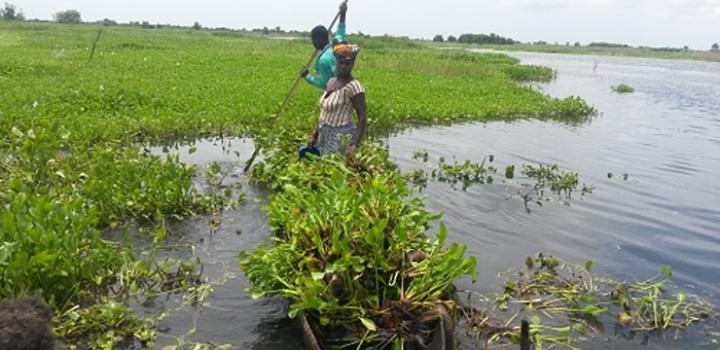The Situation
Water hyacinth is an invasive plant with a strong presence on Lake Nokoué in Benin - and across the region. It has negative effects on biodiversity because its proliferation is fatal to the fishery resources of the environment on which more than 150 bird species depend, as well as a large part of the economy of the region where fishing is the main activity through which people secure their livelihoods. Invasive water hyacinth also impacts other economic activities depending on the health of water sources, namely, trade, agriculture and transportation. When decomposing, the water hyacinth emits greenhouse gases, including methane, and thus contributes to global warming. The proliferation of water hyacinth is therefore an environmental, social and economic challenge. Our solution to this problem is to transform the problem into an opportunity for market gardeners through its valorization by composting.
The Solution
The solution introduces the composting of water hyacinth by market gardeners. This does not only help remove water hyacinth from local lakes, but holds benefits for the wider local economy: The compost obtained is used by market gardeners to fertilize their fields, improve their yields, thus making better sales and increasing their income. They apply hyacinth compost to replace expensive chemical fertilizers. Market gardeners thus reduce the costs of fertilizing their fields and save money. The composting of hyacinth improves the circulation of goods and people and revitalizes economic activities.
From an environmental standpoint, water hyacinth is an invasive species that damages the aquatic biodiversity of Lake Nokoué by contributing to its eutrophication. Its decomposition in lake sediments causes the emission of greenhouse gases. The valorization of hyacinth helps to avoid these emissions and reduce its proliferation on the lake in order to protect and maintain an environment conducive to the development of aquatic resources critical for the survival communities, whose main economic activity is fishing, as well as the diverse bird species found around the lake.
Collecting water hyacinth from the lake for composting.
Click here to read more about the solution promoted by Centre d’Actions pour l’Environnement et le Développement Durable in Benin.

